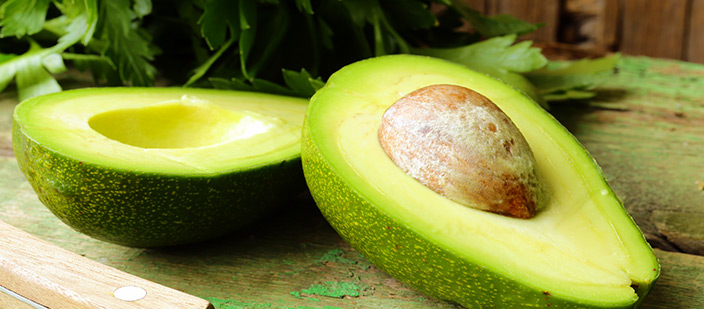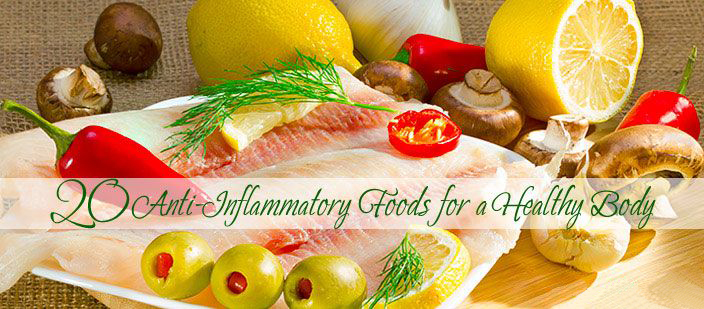Want to protect yourself from a variety of chronic illnesses? Research suggests you can by adding more anti-inflammatory foods to your diet. Unfortunately, the average American diet is low in anti-inflammatory foods. Leading health and nutrition experts, like Dr. Andrew Weil and Dr. Barry Sears, believe such diets put us at risk for disease.
Inflammation and Your Health
Inflammation is a normal immune response designed to help your body heal from an illness or injury. The immune system triggers inflammation in the body to flood an injured or sick part of your body with healing chemicals and cells, like blood cells.
Initially, inflammation is necessary for healing. Inflammation only becomes problematic when the immune system is unable to shut-off the inflammation process after a threat has been eliminated. This type of chronic inflammation has been associated with an increased risk of disease.
Some experts believe chronic inflammation can be triggered by a variety of environmental factors like stress, sleep deprivation and poor diet. If left unresolved, these factors can leave you vulnerable to chronic conditions like cancer, diabetes, Alzheimer’s and cardiovascular and autoimmune disease.
Inflammation and Your Diet
Research studies have revealed that many of the foods we eat contain pro-inflammatory and anti-inflammatory compounds. Moise Desvarieux, an inflammation researcher at Columbia University’s Mailman School of Public Health, explains that the diet’s role in inflammation is “about an imbalance – too many pro-inflammatory chemicals and not enough anti-inflammatory ones.”
Scientists don’t fully understand how our diets can prevent chronic inflammation, but there’s a growing consensus that eating more anti-inflammatory food can offer protection against diseases associated with chronic inflammation.
Anti-Inflammatory Foods
Salmon

Salmon, tuna, sardines and other oily fish are excellent sources of omega-3 fatty acids, which have anti-inflammatory properties. According to Russell Greenfield, MD, a clinical assistant professor of medicine at the University of North Carolina at Chapel Hill, the typical western diet is too low in omega-3 rich foods and includes far too many foods rich in pro-inflammatory omega-6 fatty acids. In other words, increase the omega-3’s in your diet.
Black Cod
Also known as butterfish or sablefish, black cod is another fish extremely high in omega-3’s. In fact ,it has more omega-3’s than salmon. This fish is harder to find than salmon but it might be worth the extra effort to seek it out. Dr. Weil, creator of the Anti-Inflammatory Diet says “it [black cod] has a buttery taste that makes it simply the finest fish I have ever eaten.”
Bok Choy
This leafy green, commonly used in Asian cuisine, has potent anti-inflammatory effects. Bok choy has a higher concentration of beta-carotene and vitamin A than any other variety of cabbage.
Garlic
Garlic is another anti-inflammatory spice. Studies on animals have found that garlic can shut down the inflammation process similar to the way NSAID pain medications (like ibuprofen) work.
Walnuts

If you’re not a fan of fish, adding walnuts to your diet can help you get some inflammation-fighting omega 3’s. One-quarter cup of walnuts provides more than 100 percent of the recommended daily value of plant-based omega-3 fats.
Onions
This root veggie fights inflammation with a chemical compound called allicin. The body can turn allicin into the free radical-fighting agent, sulfenic acid.
Tart Cherries
According to Oregon Health & Science University researchers, tart cherry juice reduced inflammation in lab rats’ blood vessels by up to 50%.
Bell Peppers
Bell peppers contain capsaicin, an ingredient in topical creams used to reduce pain and inflammation.
Avocados

Avocados are an anti-inflammatory super food! In addition to being an excellent source of omega-3’s, eating avocados with other vegetables can enhance your body’s ability to absorb other nutrients. Recent research found that adding a cup of avocado to a salad, increases the body’s absorption of carotenoid antioxidants by 200 to 400 percent.
Tomatoes
Tomatoes are rich in lycopene. Lycopene is a phytochemical which has been shown to reduce inflammation in the body, especially the lungs. You can increase the lycopene content of a tomato by cooking it.
Beets
Beets are high in fiber, vitamin C and plant pigments called betalains. This powerful combination of nutrients has been shown to reduce inflammation and protect against conditions like cancer and cardiovascular disease.
Coffee
Coffee has several anti-inflammatory compounds like polyphenols.
Cinnamon

Cinnamaldehyde, a chemical found in cinnamon, prevents unwanted clumping of blood platelets by inhibiting inflammatory molecule messaging.
Yogurt
The beneficial bacteria found in yogurt can ward off inflammatory states within the gut.
Turmeric
Turmeric contains curcumin, a substance that can inhibit many molecules known to play major roles in inflammation.
Black Raspberries
Christine Sardo, who manages clinical trials for Ohio State University’s College of Medicine, has found evidence suggesting “the compounds in black raspberries slow the growth rate of pre-malignant cancerous cells, and they stimulate those cells to die, a process called apoptosis.”
Ginger

This spicy root has been used for generations to treat nausea and gas, but it’s also a potent anti-inflammatory.
Apples
Apples contain an antioxidant that reduces cellular death caused by oxidation and inflammation of neurons.
Cauliflower
Cauliflower contains vitamin C, vitamin K, beta-carotene and is anti-inflammatory and antioxidant-rich.
Quinoa
Quinoa contains large amounts of flavonoids that, in animal studies, have been shown to have anti-inflammatory, anti-viral, anti-cancer and anti-depressant effects.


